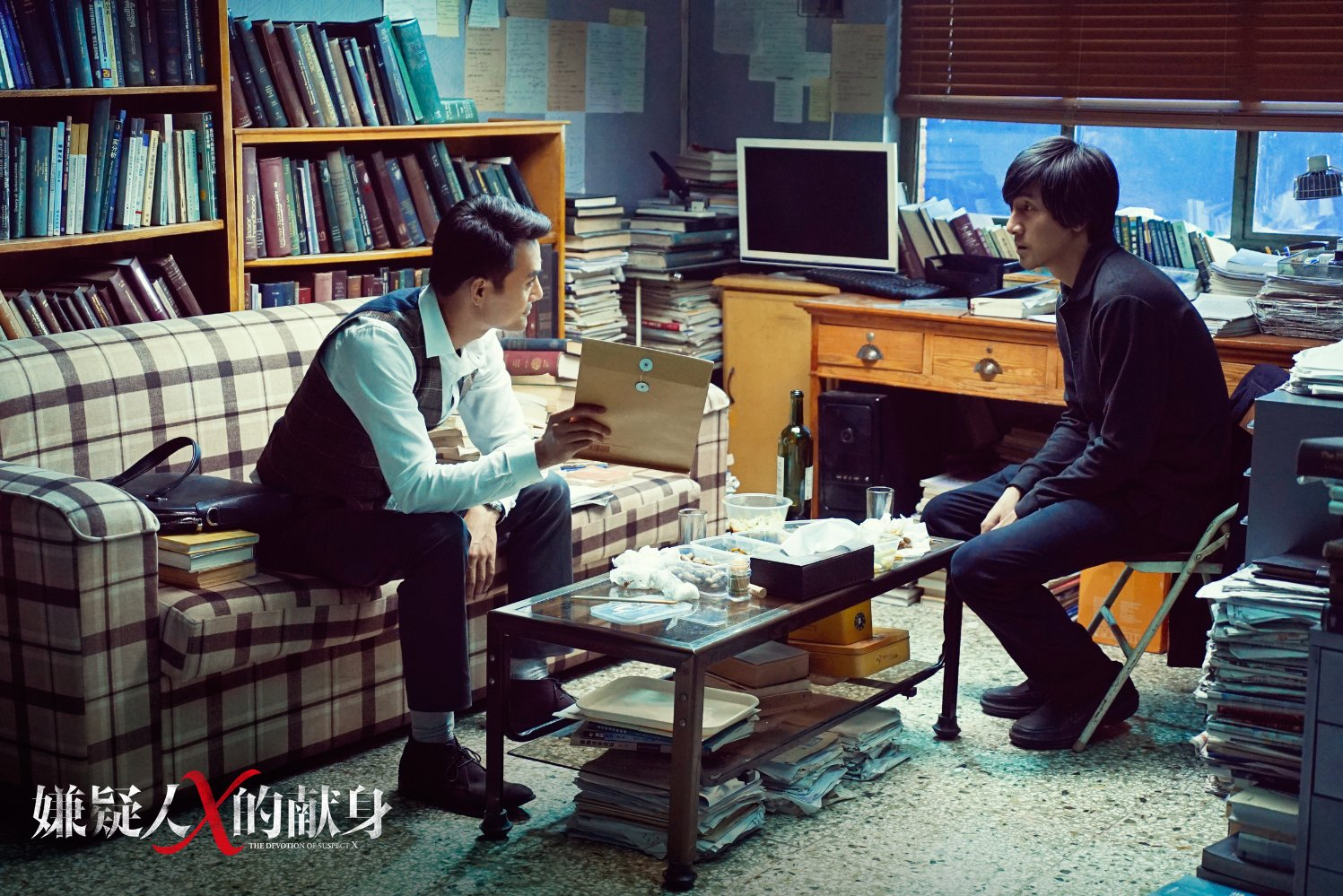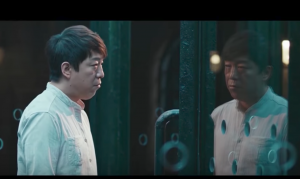Every day while CFI’s Hollywood readers take in the business of the Chinese film industry, the actual movies can sometimes seem exotic or remote. But in major US cities, mainstream Chinese films are increasingly available: thanks to Wanda’s purchase of AMC and distributors like China Lion, they get American theatrical releases practically simultaneous to their premieres at home. Though they receive virtually no publicity outside the non-Chinese community, these films are more than worth seeking out by anyone serious about engaging the Chinese industry, understanding the Chinese sensibility and familiarizing themselves with China’s talent pool. Periodically, CFI will review and point readers in the direction of noteworthy US releases of contemporary commercial and independent Chinese titles.

The Devotion of Suspect X (2017) Written by Li Jiaying, Huang Hai, Chang Jiang, Wang Chao, Chi Hai, and Keigo Higashino; Directed by Alec Su
Distributed by China Lion Films, Opens in the US March 31, 2017 (Cinemas here)
Grade: C-
Director Alec Su’s attempt at a dark thriller, The Devotion of Suspect X, which opened simultaneously in China and North America on Friday, is based on a bestselling Japanese detective novel from 2005. The film depicts a battle of wits between two grown men who have been friends since a middle school obsession with mathematics sparked an ongoing competition to outsmart one another, centering on the revival of their friendship, and rivalry, when one man comes to suspect the other of murder.
The cocksure Tang Chuan, played by actor Wang Kai in bright, bespoke suits, is a square-jawed professor of forensic science who struts his crime-solving stuff around a police college in Harbin. Shi Hong, on the other hand—played as mumbling and morose by Zhang Luyi in a daily baggy uniform of gray—is a shuffling, intensely shy man-child of a middle school math teacher, with complex equations hanging in the air about his head like his shaggy bangs.
The corpse that reunites them is found brutally disfigured on a rocky riverbed by a bridge. Because of the nature of the crime, the local police, including a young lead detective who styles himself Tang’s protege are determined to solve the case quickly so as to “avoid panic” in the city.
In the course of investigation, Tang stumbles upon his old friend Shi living next door to the case’s prime suspect, the ex-wife of the man found under the bridge with his face smashed in by a hammer and his fingerprints scorched away.
Sadly, director Su must have forgotten that when watching a thriller it is more gratifying for the audience if they are shown, not told how a crime is solved, and if a few things are left to the imagination. In his sophomore outing behind the camera, Su attempts a procedural by having a detective’s voiceover explain nearly his every move, only to have master logician Tang swoop in onscreen to correct his mistaken assumptions about the case.
Rather than illuminating, it is pretty annoying to be lumped in with the greenhorn detective. His voiceover, followed by the periodic revelation of his teacher’s tricks of the trade, does little to build up Tang’s brilliance. Tang’s character—and the script that Wang had to work with—is too reliant on starched shirts, good looks and bold movements. Trying to act the dialogue meant to convey that he has grasped the complex math undergirding his sleuthing, Wang is too often left to produce a quizzical glance followed by a knit brow, a Eureka moment, and a dash out the door to save the day.
The screenplay, by five Chinese writers along with Japanese novelist Keigo Higashino has evidently lost something in translating Higashino’s book, which also spawned two previous films, one in Japan and one in South Korea. The Japanese film was the third-highest grossing film in Japan in 2008, and the Korean remake garnered awards and was well-reviewed in the West.
To add insult to injury, about a third of the way through, a flashback sequence reveals the murder to have been an act of self-defense, meaning we not only learn who did it, but must then sit still as the two old school buddy/rivals try again and again to outsmart one another—one trying to escape detection, the other trying to solve a riddle and pin down the reason for helping the murderer with a cover-up. At the end of the day, the motive is obvious: love.
Worse, Ruby Lin, the Taiwanese superstar who plays Shi’s neighbor and the object of his affections—the woman [Spoiler alert! In this case, consider it a favor] whose ex-husband she kills in self-defense—is as weepy and breathless as Tang is like a Chinese Ken doll, and Shi is like a lovestruck Chinese Ringo Starr under his mop of hair.
Western audiences may also be unsettled by the idea that the unspeakable acts that Shi commits to help his lady neighbor and thus win her affection could deserve compassion. In our culture, this is plain creepy, but in China, where a generation of male only children have been mathematically aced-out and will never have a woman to love because there aren’t enough to go around, the story does strike a certain poignant chord.
As well, Wang Kai is someone to keep an eye on. He has already set to star in John Woo’s forthcoming A Better Tomorrow reboot, and at the opening-day showing I attended at AMC’s Times Square multiplex in New York City, each of his appearances on screen elicited audible gasps from a twenty-something Chinese woman seated nearby.
It cannot have been lost on the film’s producers that Sherlock Holmes has always been popular in China, with the recent Benedict Cumberbatch incarnation launching a whole new craze. But while putting an imperious, relentlessly mathematical detective with a sharp dress sense on screen may have been a part of decision to make the film, in the end it lacks the snap and sleek production of Sherlock, playing more like a telenovela crammed into the mold of a policier than an engrossing mystery story with a stylish, if tragic romantic thread.
WHAT DOES THE GRADE MEAN?
Here are some recent & modern-era vintage Chinese and Hong Kong films for comparison
- A+
- PLATFORM (2000, dir Jia Zhangke)
- THE WORLD (2004, dir. Jia Zhangke)
- DRUNKEN MASTER 2 (1994, dir. Lau Kar Leung & Jackie Chan)
- KUNG FU HUSTLE (2004, dir. Stephen Chow)
- A
- LET THE BULLETS FLY (2010, dir Jiang Wen)
- THE MERMAID (2016, dir. Stephen Chow)
- A TOUCH OF SIN (2013, dir. Jia Zhangke)
- STILL LIFE (2006, dir. Jia Zhangke)
- MOUNTAINS MAY DEPART (2015, dir. Jia Zhangke)
- LITTLE BIG SOLDIER (2010, dir. Ding Sheng)
- EXTRAORDINARY MISSION (2017, dir. Alan Mak & Anthony Pun)
- MR SIX (2015, dir. Guan Hu)
- A WORLD WITHOUT THIEVES (2004, dir. Feng Xiaogang)
- SUZHOU RIVER (1999, dir. Lou Ye)
- HOUSE OF FLYING DAGGERS (2004, dir Zhang Yimou)
- RAISE THE RED LANTERN (1991, dir. Zhang Yimou)
- A-
- DUCKWEED (2017, dir. Han Han)
- I BELONGED TO YOU (2016, dir. Zhang Yibai)
- B+
- THE GREAT WALL (2016, dir. Zhang Yimou)
- OLD STONE (2016, dir. Johnny Ma)
- CRAZY STONE (2006, dir. Ning Hao)
- GO, LALA GO (2010, dir. Xu Jinglei)
- B
- KUNG FU YOGA (2017, dir. Stanley Tong)
- RAILROAD TIGERS (2016, dir. Ding Sheng)
- THE WASTED TIMES (2016, dir. Cheng Er)
- CHONGQING HOT POT (2016, dir. Yang Qing)
- MONSTER HUNT (2015, dir. Raman Hui)
- B-
- JOURNEY TO THE WEST: THE DEMONS STRIKE BACK (2017, dir. Tsui Hark)
- SOME LIKE IT HOT (2017, dir. Song Xiaofei & Dong Xu)
- BORN IN CHINA (2016, dir. Lu Chuan)
- D-
- TINY TIMES (2013, dir. Guo Jingming)





